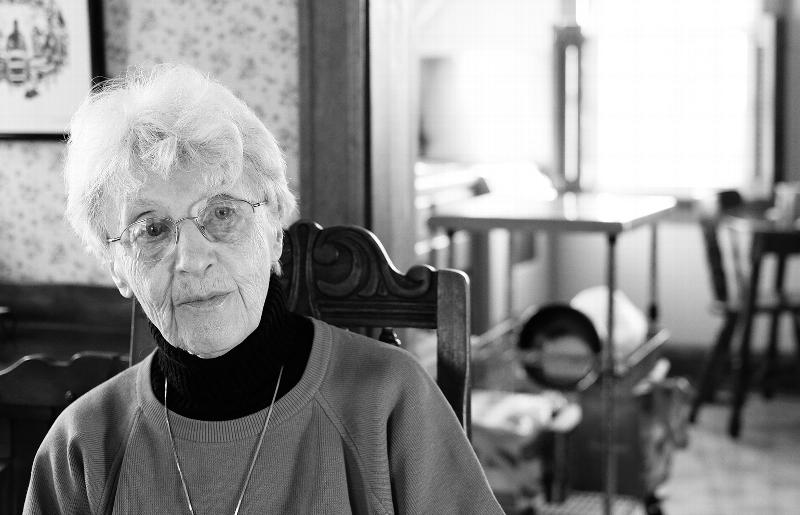
Franciscan Sister Gwen Hennessey of Dubuque, Iowa, talks about the time that the Clare Guest House has been open as a transitional home for women who served jail time. (CNS photo/Jerry L Mennenga)
SIOUX CITY, Iowa (CNS) — The director of Clare Guest House puts a different spin on the “What Would Jesus Do” slogan.
“I think what we provide is ‘What Jesus Would Do,'” said Franciscan Sister Gwen Hennessey of the transitional home for women who have been released from prison.
Clare Guest House began as an initiative of the Sioux City Multicultural Neighborhood Project, a ministry authorized by the Sisters of St. Francis of Dubuque, Iowa, in 1998. Its mission: respond to the needs of poor women and children, collaborate in the development of neighborhood communities and serve as an outreach to Spanish-speaking immigrant groups.
[hotblock]
“When we no longer had any Spanish-speaking sisters for the project, it evolved into this project of providing a safe, supportive environment for women coming out of prison,” explained Sister Grace Ann Witte, who resides at the house with Sister Gwen.
In 2005, a team of Franciscan sisters began planning for the halfway house. They developed a philosophy for the house, identified the type of women it would serve, drafted rules and staffing plans and presented its findings, Sister Grace Ann explained.
“A small group of women agreed to continue to meet as an advisory group, colloquially described as the ‘wise women,’ to further finalize plans,” she said. “It was at that time the name Clare Guest House developed, in honor of St. Clare of Assisi, who lived an active life among the poor, serving lepers, before being forced into an enclosed contemplative life.”
“I think she would be very proud of this house, named in her honor,” Sister Gwen added.
In July 2005, the team received a $20,000 grant from the Sisters of St. Francis Ministry Fund to begin the ministry.
A two-story, five-bedroom house, which had been a residential treatment facility for teenage girls — but vacant for about five years — was rented from Sioux City Boys and Girls Home and Family Services.
Sister Gwen moved in Sept. 27, 2005, to serve as live-in director.
“The first guest arrived on Dec. 12, 2005, the feast of Our Lady of Guadalupe,” she noted. “I don’t think it was a coincidence that first guest was half-Hispanic.”
In 2006, Clare Guest House was incorporated as independent organization, distinct from Sioux City Multicultural Neighborhood Project and from the Sisters of St. Francis. It achieved nonprofit status in 2008.
The home has had 106 admissions over the last decade, most from the Iowa Correctional Facility for Women in Mitchellville. Some have returned to the house more than once, Sister Gwen admitted.
“We’ve had some women who were not success stories,” she said, “but we’ve also had many who have, who have kept in touch with us, thanking us for getting their lives back.”
Sister Gwen could point to herself as a success story, as she has once “walked the walk.”
Sister Gwen and her sister Dorothy Hennessey, also a Franciscan nun, were among 13 women arrested in a civil disobedience action in 2000 during a nonviolent protest at the former U.S. Army School of the Americas in Fort Benning, Georgia. Both women received a six-month prison sentence, serving time at a federal facility in Illinois.
Clare House is the only transitional home of its type in northwest Iowa and the only one under the auspices of the Dubuque Franciscans.
Sister Grace Ann pointed out that guests — who are all on parole — must commit to stay at least two months but no more than six months.
“During that time, women must look for work, meet with parole officers and help with chores, such as cooking and cleaning,” she said. “In some cases, especially for health reasons, we have allowed the stay to be longer.”
There is no typical Clare House guest, Sister Grace Ann said.
“We have had women as young as 19 and as old as 64. However, the most frequently occurring ages were 25, 26,” she said. “We’ve had women who completed an eighth-grade education and ones who earned master’s degrees.”
What many of the women share is substance abuse. Almost 90 percent of the women on their application forms indicated a problem with substance abuse and almost 80 percent have been in treatment for chemical dependency.
“It’s certainly one of our greatest challenges — mental health issues because of the environment in which these women were raised with their addictions,” Sister Gwen said.
Clare Guest House funds primarily come from private donations; however, two substantial donations have been received from Missouri River Historical Development , the Siouxland nonprofit that holds the state gaming license for the Hard Rock Hotel and Casino in Sioux City.
A future need of Clare Guest House may be leadership. Sister Grace Ann is 79 and Sister Gwen is 84.
“We have no plan,” Sister Grace Ann said with a smile, while Sister Gwen laughed aloud, adding, “We leave it all in God’s hands.”
***
Fox is managing editor of The Catholic Globe, newspaper of the Diocese of Sioux City.
PREVIOUS: Bishops of Atlanta province consider ways to lead in the face of crisis
NEXT: After 50 years, draft board protesters insist what they did was right


Share this story